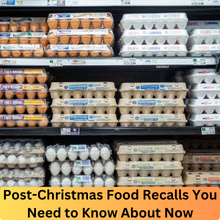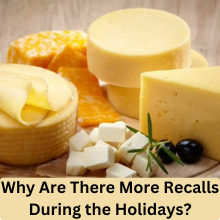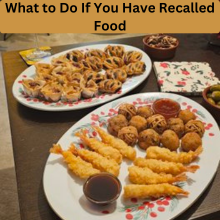
The stockings have been emptied, the gifts are unwrapped, and the Christmas feast has been devoured, but what happens the day after? As you dive into your fridge to grab a leftover slice of pizza or reheat that comforting bowl of soup, there’s one question that might cross your mind: Are these leftovers safe?
In the days following Christmas, food recalls are often announced, creating anxiety about the safety of holiday leftovers. From popular items like Costco’s Handsome Brook Farms Organic Eggs to convenient snacks like Lay’s Potato Chips, there have been several significant food recalls in the holiday season. So, what do these recalls mean for you and your family? Let’s dive in and take a closer look.
What is a Food Recall?
Before we dive into the specifics, let’s first understand what a food recall is. A food recall happens when a manufacturer or a regulatory agency, like the FDA or USDA, pulls a product from the market because it may pose a health risk. This could be due to contamination by harmful bacteria (like Salmonella or E. coli), undeclared allergens, or even physical contaminants (like metal or plastic).
Recent Post-Christmas Food Recalls to Watch Out For
Several popular food products have been recalled recently, causing concern among consumers. Here’s a breakdown of some of the most notable recalls to keep in mind as you enjoy your holiday leftovers.
1. Costco’s Handsome Brook Farms Organic Eggs
Recall Reason: Potential Salmonella contamination
Location: Nationwide, including Costco stores in Queens, New York
Eggs are a staple during the holidays, whether for breakfast, baking, or as an ingredient in holiday dishes. But Costco’s Handsome Brook Farms Organic Eggs have been pulled from shelves due to potential Salmonella contamination. This is especially concerning since Salmonella can lead to severe foodborne illnesses, with symptoms like diarrhea, fever, and abdominal cramps. If you purchased these eggs, it’s important to dispose of them immediately.
2. Lay’s Classic Potato Chips
Recall Reason: Undeclared Milk Allergens
Location: Oregon and Washington
Lay’s Classic Potato Chips are a holiday snack favorite, but a recent recall has raised alarms for those with dairy allergies. These chips, sold in Oregon and Washington, were found to contain undeclared milk allergens, posing a risk for individuals with dairy sensitivities. Always check the packaging carefully for allergens, even in seemingly simple snacks.
3. Oysters and Manila Clams from Pickering Passage, Washington
Recall Reason: Norovirus contamination
Location: Pickering Passage, Washington
Seafood often takes center stage during holiday feasts, and oysters or clams are common choices. However, shellfish from Pickering Passage in Washington has been recalled due to a Norovirus outbreak. Raw or undercooked seafood can be particularly dangerous when contaminated with Norovirus, which causes stomach issues like nausea, vomiting, and diarrhea. Always ensure that seafood is thoroughly cooked before consumption.
4. Connie’s Thin Crust Cheese Frozen Pizza
Recall Reason: Plastic contamination
Location: Nationwide
Frozen pizza is often the go-to meal for busy holiday seasons, but Connie’s Thin Crust Cheese Pizza has been recalled due to plastic contamination. This recall affects consumers who may have eaten a pizza with foreign plastic pieces that could pose a choking hazard or cause injuries. If you have any of these pizzas at home, it’s crucial to check the batch number and return or dispose of them.
5. Lidl’s Taste of Deutschland Frozen Buttered Vegetables
Recall Reason: Undeclared Milk Allergens
Location: Nationwide (Lidl stores)
Frozen buttered vegetables are a popular side dish for holiday meals, but Lidl’s frozen vegetables were recently flagged for undeclared milk allergens. For anyone with lactose intolerance or dairy allergies, this recall is especially important. It’s crucial to read ingredient labels, even for the most basic frozen foods.
6. Impero Foods & Meats Raw Italian Pork Sausage
Recall Reason: Lack of federal inspection
Location: Various locations
Known for its rich flavor, Italian pork sausage is often a key ingredient in stuffing, pasta dishes, or holiday sausages. However, Impero Foods & Meats Raw Italian Pork Sausage has been recalled because it was distributed without proper federal inspection. Consuming improperly inspected meat can lead to contamination with harmful bacteria, so avoid using these sausages in your meals.
Why Are There More Recalls During the Holidays?
The surge in food recalls during the holidays may seem alarming, but there are several factors at play. The holiday season is a time of increased food consumption, and with that comes a higher volume of food production, distribution, and consumption. More people are buying packaged foods, ready-to-eat meals, and frozen items, which increases the chance of contamination or oversight.
Additionally, the global nature of food production makes it easier for foodborne illnesses and allergens to spread. In some cases, recalls may affect food items that are distributed across multiple states or even countries, making it harder to track and contain.
Also read: Silent COVID Surge Could Hit US This Holiday — Are You Safe?
How to Stay Safe During Post-Christmas Food Recalls
Food recalls can be overwhelming, especially after the holiday rush. But there are simple steps you can take to keep your family safe from potential risks.
1. Stay Informed About Recalls
Sign up for notifications on trusted websites like the FDA or USDA to get real-time updates on food recalls. You can also follow social media accounts or apps that track recalls.
2. Check Food Packaging Carefully
When reviewing your holiday leftovers, take a moment to check the packaging for batch numbers, expiration dates, and product codes. If the product is part of a recall, dispose of it immediately, and do not attempt to consume it.
3. Reheat Leftovers Properly
Make sure that leftovers are stored in airtight containers in the fridge and consumed within 3-4 days. When reheating, ensure the food reaches a minimum temperature of 165°F (73.8°C) to kill any harmful bacteria.
4. Educate Your Guests
If you’re hosting guests or sharing leftovers, make sure everyone knows about any recalls that might affect your meals. This is especially important for individuals with food allergies or sensitivities.
5. Recognize the Symptoms of Foodborne Illnesses
If you or anyone in your family experiences symptoms like nausea, vomiting, diarrhea, or fever after eating potentially contaminated food, seek medical help immediately. Reporting foodborne illnesses to local health authorities can help prevent further outbreaks.
What to Do If You Have Recalled Food
If you discover that you have food in your fridge or pantry that has been recalled, don’t panic. Here’s what you can do:
- Check the Recall Information: Verify the product details, such as batch numbers, expiration dates, and packaging. Compare this to the information in the recall notice.
- Dispose of Contaminated Products: If you find that you have a recalled product, discard it immediately. Do not attempt to eat it, even if it seems okay.
- Return the Product: Many stores allow you to return recalled products for a refund or replacement.
- Clean Your Kitchen: After disposing of the recalled food, clean any surfaces or utensils that came into contact with it to avoid cross-contamination.
The Importance of Food Safety Awareness
Food safety isn’t just a concern during the holiday season—it’s a year-round responsibility. The Centers for Disease Control and Prevention (CDC) estimates that nearly 48 million people in the United States are sickened by foodborne illnesses each year. The holidays might be a time for indulgence, but it’s essential to remain vigilant about food safety to protect yourself and your loved ones.
Also read: SpaceX’s Bandwagon-2 Launch: A Game-Changer for Space
Conclusion
While food recalls are an inevitable part of the food system, staying informed and taking basic precautions can help you enjoy your post-Christmas leftovers without worry. From checking food labels to ensuring your leftovers are properly stored and reheated, small steps can go a long way in protecting your family’s health.
So, as you sip your last cup of holiday cocoa or bite into that leftover slice of pizza, remember to double-check the safety of your meals. In the end, it’s all about enjoying the holidays and keeping everyone safe in the process.
FAQs
What should I do if I find a recalled product in my fridge?
If you find a recalled product, check the recall notice for batch numbers and expiration dates. Dispose of the product immediately and clean any surfaces it touched.
How can I stay informed about food recalls?
You can sign up for notifications from the FDA or USDA’s websites or use apps that track food recalls.
What are the common reasons for food recalls?
The most common reasons for food recalls are contamination with harmful bacteria (e.g., Salmonella, E. coli), undeclared allergens, or physical contaminants like plastic or metal.
How long can I safely keep leftovers in the fridge?
Leftovers should be consumed within 3-4 days. Always store them in airtight containers to prevent contamination.
How can I avoid foodborne illnesses during the holidays?
Check for food recalls, store food properly, reheat leftovers to at least 165°F, and practice good hygiene by washing your hands and cooking utensils regularly.

